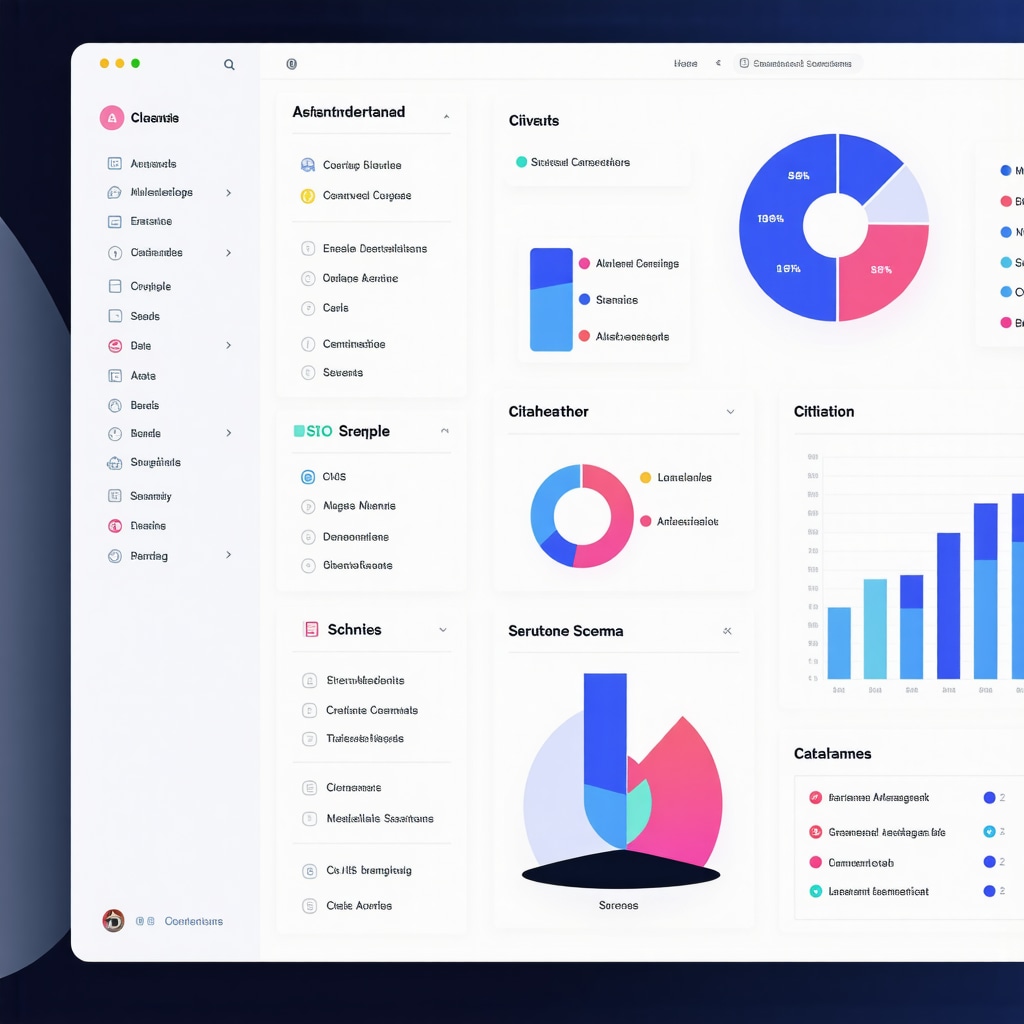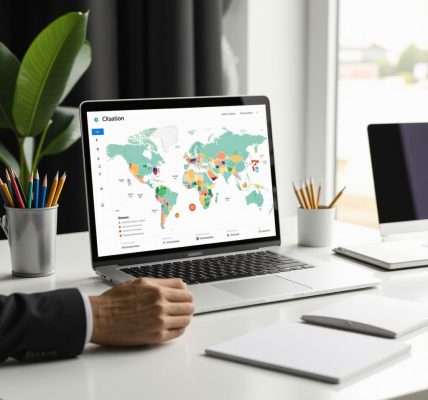Unlocking the Power of GMB Citations for Local SEO Dominance
In the fiercely competitive landscape of local search, mastering your Google My Business (GMB) citation management is not just beneficial—it’s essential. Accurate and consistent citations across trusted directories and platforms amplify your business’s local authority, directly impacting your visibility in Google’s Local Pack. But how do you harness this power effectively? This guide delves into advanced best practices that go beyond basic listing management, offering you a roadmap to sustainable local SEO success.
Precision and Consistency: The Pillars of Effective Citation Management
One common pitfall businesses face is inconsistent business information—name, address, phone number (NAP)—across citations. Such discrepancies erode trust signals that Google uses to rank local results. Expert GMB citation management involves auditing existing citations for accuracy and ensuring uniformity. Tools like Moz Local and BrightLocal can assist in identifying and rectifying citation inconsistencies, but human oversight remains crucial for nuanced verification, especially when dealing with franchise or multi-location businesses.
Strategic Citation Placement: Quality Over Quantity
While the volume of citations matters, their quality and relevance weigh more heavily. Prioritize niche-specific and locally authoritative directories that your target audience frequents. For instance, an upscale restaurant should be listed on gourmet and travel-focused directories rather than generic platforms alone. Additionally, securing citations from well-regarded local chambers of commerce or industry associations can enhance your business’s credibility and local SEO strength.
How Do GMB Citations Influence Google’s Local Search Algorithm?
GMB citations serve as verifiable references that reinforce your business’s legitimacy and geographical presence. Google’s algorithm cross-references citation data with your GMB listing to assess consistency and trustworthiness. A robust citation profile reduces ambiguity, making your business a prime candidate for higher rankings in the Local Pack and Google Maps. Research by Moz highlights that citation signals remain a top local ranking factor, underscoring the critical role of precise citation management (Moz Local Search Ranking Factors).
Monitoring and Updating: The Continuous Journey of Citation Optimization
Local SEO is dynamic; hence, citation management is not a one-time task. Regular audits—quarterly or biannually—ensure that your citations reflect any changes such as new phone numbers, address shifts, or business hours updates. Leveraging automation tools can streamline this process, but staying engaged with your listings prevents outdated information from undermining your SEO efforts and customer trust.
Leveraging Advanced GMB Citation Management Tools and Services
For businesses aiming to scale local visibility efficiently, expert GMB citation services provide comprehensive solutions including citation building, cleanup, and ongoing management. These services integrate seamlessly with broader GMB SEO strategies, such as review generation and keyword optimization, to deliver measurable improvements in local rankings. Discover how professional citation management can elevate your profile by exploring expert GMB citation services for enhanced rankings.
Call to Action: Elevate Your Local SEO Game Today
Ready to transform your local search presence? Share your experiences with citation management or ask questions below to join a community focused on achieving top-tier local SEO results. For deeper insights, explore our comprehensive resources, including the master Google Maps SEO techniques to dominate the local 3-pack and unlock your business’s full potential.
When Citations Go Beyond Listings: Personal Lessons from My SEO Journey
Reflecting on my own experience managing multiple local business profiles, I realized early on that citations are more than just digital mentions; they’re trust signals that customers and search engines alike rely on. I recall a client who had inconsistent phone numbers across several directories. Fixing those discrepancies wasn’t just a task for accuracy—it dramatically improved their foot traffic and online inquiries. This personal lesson cemented the idea that citation management requires a hands-on, detail-oriented approach to truly resonate with what Google values.
Understanding the Nuances: Why Context Matters in Citation Management
One insight I gained over time is the importance of context when selecting citation sources. Not all directories carry equal weight, and blindly mass-submitting your business information can backfire. I found that focusing on local, industry-specific platforms yielded better SEO gains and fostered genuine engagement. For example, when optimizing a boutique fitness studio, targeting local wellness directories and community event calendars proved more effective than generic listing sites. This strategy aligns with best practices outlined in Moz’s Local Search Ranking Factors, reinforcing that quality and relevance trump quantity in citation building.
What Are the Hidden Challenges in Maintaining Citation Accuracy Over Time?
Maintaining citation accuracy isn’t a set-it-and-forget-it task. Businesses evolve—addresses change, phone numbers update, and sometimes services expand to new locations. From my experience, the challenge lies in consistently monitoring these updates across dozens of platforms. I’ve had clients miss important updates that led to confusing customer experiences and lost trust. This is why I emphasize the necessity of periodic audits and sometimes investing in professional citation management services that automate and verify data accuracy across the web.
Practical Steps I Take for Citation Cleanup and Growth
When I start a citation cleanup, I usually begin with a comprehensive audit using tools like BrightLocal or Moz Local to identify inconsistencies. Then, I manually verify each citation, especially on high-authority directories, to ensure all business details are precise and formatted uniformly. Growing citations involves thoughtful outreach to niche directories and local partners, which not only builds SEO value but also creates meaningful community connections. If you’re curious about how to optimize your citations effectively, the guide on best practices for GMB citation management is a fantastic resource.
Integrating Citations with Comprehensive Local SEO Strategies
Citations don’t work in isolation. In my projects, I always integrate citation efforts with other local SEO tactics—like optimizing Google Business Profiles, managing reviews, and leveraging geo-targeted keywords. This holistic approach ensures that citation signals reinforce other ranking factors, amplifying overall local visibility. If you want to dive deeper into how to combine these tactics for maximum impact, check out the comprehensive local SEO optimization techniques that have guided many of my successful campaigns.
Encouraging You to Share: What’s Your Citation Story?
Have you encountered challenges or successes with citation management in your local SEO efforts? I’d love to hear your stories or questions—drop a comment below and let’s learn from each other’s experiences. If you’re just getting started, don’t hesitate to explore more on how to optimize your Google Business Listing effectively by visiting this helpful guide. Sharing knowledge is how we all grow stronger in the local SEO game!
Harnessing Semantic Consistency: The Next Frontier in Citation Accuracy
Beyond the traditional NAP consistency, semantic consistency involves ensuring that your business descriptions, categories, and contextual details align perfectly across all citation sources. This subtle layer of optimization helps search engines better understand your business niche and relevance, which can significantly boost your local search rankings. For example, if your business is a “family-owned Italian restaurant,” this descriptor should appear consistently in your profiles and citations, not just generic terms like “restaurant.” This advanced approach reinforces your business identity and aligns with Google’s evolving emphasis on context and intent in local search algorithms.
How Does Semantic Consistency Impact Local Search Ranking Beyond Basic NAP?
Semantic consistency contributes by providing a rich, uniform context for your business entity, enabling Google’s natural language processing to map your business more accurately within local search ecosystems. According to a detailed study by Search Engine Journal, businesses that maintain consistent semantic signals across citations often experience improved local pack visibility and enhanced click-through rates (Search Engine Journal on Semantic SEO and Local Ranking). This is because semantic data helps disambiguate businesses with similar names or services, making your listing stand out in crowded markets.
Advanced Citation Cleanup: Leveraging AI and Machine Learning for Precision
Manual audits are invaluable but can become overwhelming as your citation footprint grows. Enter AI-powered tools that can intelligently scan, compare, and suggest corrections by learning your business patterns and typical data formats. These tools not only identify discrepancies but also predict potential future inconsistencies based on observed trends. Integrating such solutions into your workflow allows proactive citation maintenance, reducing the risk of ranking drops due to outdated or conflicting information.
Building Authority Through Strategic Citation Networks and Partnerships
Another sophisticated technique involves cultivating citation networks within your local ecosystem. This means collaborating with complementary businesses, local influencers, and community organizations to create mutual citations that carry contextual relevance. For instance, a boutique gym partnering with local health food stores and wellness bloggers can generate citations that signal a vibrant local presence and interconnected authority. This method transcends mere listing quantity and taps into the power of community-based SEO strategies.
Integrating GMB Citations with Emerging Local Search Technologies
As voice search, mobile-first indexing, and AI-driven local assistants become mainstream, citations must adapt to these channels. Structured citation data optimized for voice queries—using natural language phrases and question-answer formats—can improve your chances of appearing in voice search results. Additionally, ensuring your citations are compatible with schema markup and knowledge graph standards helps search engines pull accurate data for featured snippets and rich results.
What Role Do Structured Data and Schema Markup Play in Amplifying Citation Effectiveness?
Structured data and schema markup act as enhanced signals that complement your citations by explicitly communicating your business details to search engines in a standardized format. This amplification supports better indexing and richer search result displays. According to Google’s own developer documentation, implementing LocalBusiness schema markup alongside consistent citations increases the likelihood of your business appearing in enhanced search features, driving greater visibility and trust.
Call to Action: Elevate Your Citation Strategy with Cutting-Edge SEO Insights
Are you ready to push your local SEO beyond fundamentals? Share your experiences or questions about semantic consistency, AI-powered citation management, or schema integration in the comments below. For those eager to deepen their strategic knowledge, explore our advanced guides on mastering local SEO with innovative citation strategies and stay ahead in the competitive local search arena.
Decoding the Intersection of AI and Citation Management for Local SEO Mastery
The advent of artificial intelligence has revolutionized how we approach citation management. Beyond routine audits, AI-powered platforms analyze citation data patterns, predict inconsistencies before they manifest, and recommend strategic enhancements tailored to your business niche. Leveraging machine learning models enables SEO professionals to maintain impeccable citation profiles even across extensive multi-location enterprises, ensuring sustained local search dominance without the exhaustive manual overhead.
Semantic Enrichment: Crafting Contextual Consistency That Resonates with Search Engines
To truly stand out in local search results, businesses must transcend mere NAP uniformity and embrace semantic enrichment. This involves harmonizing business descriptions, service categories, and attribute metadata across all citation sources to reflect a coherent and compelling brand narrative. Such alignment empowers search engines’ natural language algorithms to precisely associate your business with relevant queries, elevating your prominence in competitive local markets.
How Can Integrating Structured Data and Semantic Consistency Amplify Citation Impact in Emerging Local Search Paradigms?
Integrating structured data schemas like LocalBusiness schema markup with semantically consistent citations creates a synergistic effect that enhances your listing’s discoverability across diverse platforms—including voice assistants, mobile search, and knowledge panels. This fusion facilitates richer search result features, disambiguates business identity amidst similar entities, and aligns with Google’s evolving emphasis on context and intent. As elucidated by Search Engine Journal, this advanced integration yields measurable improvements in local pack rankings and user engagement metrics.
Building Robust Citation Ecosystems via Strategic Local Partnerships and Community Engagement
Advanced citation strategies now emphasize cultivating reciprocal citation networks embedded within your local ecosystem. Collaborating with complementary businesses, local thought leaders, and community organizations generates contextually relevant citations that bolster domain authority and signal authentic community integration to search engines. This method not only strengthens SEO signals but also fosters genuine brand credibility and customer trust.
Adapting Citation Strategies for Voice Search and AI-Driven Local Assistants
As voice queries and AI-powered local search assistants gain traction, citation content must be optimized for natural language processing. This involves incorporating conversational keywords, question-answer pairs, and FAQ-style information within citations and structured data to improve compatibility with voice search algorithms. Ensuring your business information is readily parseable by these technologies positions your brand to capture emerging traffic streams effectively.
Innovative Citation Audit Frameworks: Combining Automation with Expert Oversight
While AI streamlines citation audits, expert human analysis remains indispensable for nuanced decision-making—particularly in interpreting local market dynamics and managing complex multi-location data. Developing hybrid workflows that integrate automated discrepancy detection with manual validation fosters precision and adaptability, delivering superior citation accuracy and resilience against algorithmic shifts.
Call to Action: Propel Your Local SEO Forward with Cutting-Edge Citation Innovations
Are you prepared to transcend traditional citation management and embrace AI-driven, semantically enriched, and schema-optimized strategies? Engage with us by sharing your challenges or insights below. For a deep dive into these advanced methodologies, explore our latest comprehensive guides on mastering local SEO with innovative citation strategies and position your business at the forefront of local search evolution.

Frequently Asked Questions (FAQ)
What exactly are Google My Business (GMB) citations and why do they matter for local SEO?
GMB citations are mentions of your business’s name, address, phone number, and other relevant details on various websites, directories, and platforms. They serve as trust signals for search engines, validating your business’s existence and location. Consistent and accurate citations help improve your local search rankings by confirming your business information across the web.
How can I ensure my citations remain consistent across multiple platforms?
Start by conducting a comprehensive audit of all existing citations using tools like Moz Local or BrightLocal. Manually verify that your business name, address, phone number (NAP), and other details match exactly across listings. Establish a standardized format for your information and update all platforms whenever changes occur. Regular audits, ideally quarterly or biannually, help maintain this consistency.
Is quantity or quality of citations more important for local SEO?
While having numerous citations can help, the quality and relevance of those citations are far more valuable. Prioritize listings on authoritative, niche-specific, and locally relevant directories rather than indiscriminately submitting to every platform. Strategic placement enhances your credibility and aligns better with Google’s local search algorithm.
What role does semantic consistency play beyond basic NAP information?
Semantic consistency involves harmonizing business descriptions, categories, and contextual details alongside NAP data across all citation sources. This enriches the information search engines receive, enabling better understanding of your business niche and improving your local search relevance. It helps differentiate your business in competitive markets by aligning with Google’s emphasis on context and user intent.
How do structured data and schema markup enhance citation effectiveness?
Structured data and schema markup provide a standardized way to communicate your business information directly to search engines. When combined with consistent citations, they improve indexing accuracy and enable rich search features like knowledge panels and featured snippets. This leads to enhanced visibility, better user engagement, and higher chances of appearing in voice search results.
Can AI tools really improve citation management?
Yes. AI-powered citation tools can intelligently scan your citation footprint, identify inconsistencies, and even predict potential data conflicts before they occur. They streamline audits and maintenance, especially for businesses with multiple locations, by automating routine tasks while allowing expert oversight for nuanced decisions.
How do local partnerships and community engagement influence citation strategies?
Building reciprocal citation networks with complementary local businesses, influencers, and community organizations creates contextually relevant citations that boost your domain authority. These partnerships signal authentic community integration to search engines, enhancing trust and local SEO performance while fostering genuine brand credibility and customer relationships.
What challenges should I expect in maintaining citation accuracy over time?
Businesses evolve, and keeping citations updated across dozens of platforms can be overwhelming. Common challenges include outdated addresses, phone numbers, or business hours leading to customer confusion and lost trust. Consistent monitoring, scheduled audits, and possibly professional citation management services are necessary to mitigate these issues.
How can I optimize citations for voice search and AI-driven assistants?
Optimize citations by incorporating natural language phrases, question-and-answer formats, and FAQ-style content. Ensure your structured data supports conversational queries and that your business information is easily parseable by voice assistants. These strategies increase the likelihood of your business being surfaced in voice search results and AI-driven local recommendations.
What is the best approach to integrate citation management into a broader local SEO strategy?
Combine citation efforts with Google Business Profile optimization, review management, geo-targeted keyword usage, and structured data implementation. This holistic approach creates reinforcing signals across multiple facets of local SEO, maximizing your chances of dominating local search results and improving overall online visibility.
Trusted External Sources
- Moz Local Search Ranking Factors – Offers comprehensive research on the impact of citations and other local SEO ranking signals, guiding effective citation management strategies.
- Google Developers – LocalBusiness Schema Markup – Provides authoritative documentation on implementing structured data to enhance local business listings and improve search appearance.
- Search Engine Journal – Semantic SEO and Local Ranking – Delivers expert insights and case studies on how semantic consistency and schema markup influence local search outcomes.
- BrightLocal – A leading platform for local SEO tools and citation audits, offering data-driven guidance and practical solutions for citation accuracy and growth.
- Google My Business Help Center – The official resource for managing GMB listings, including best practices for citation integration and profile optimization.
Conclusion
Mastering Google My Business citation management is a pivotal component of achieving local SEO dominance. This article has illuminated the critical importance of precise NAP consistency, the strategic value of high-quality and contextually relevant citations, and the evolving role of semantic enrichment and structured data. Embracing AI-powered audit tools and cultivating local partnerships further amplify citation effectiveness, positioning your business to thrive in an increasingly competitive local search environment. Integrating these advanced citation strategies within a holistic local SEO framework ensures robust visibility, enhanced trust, and sustained customer engagement. Ready to elevate your local search rankings? Share your citation experiences, explore our in-depth guides, and apply these expert insights to unlock your business’s full local potential today.




This article really highlights how vital consistent and high-quality citations are for local SEO success. From my experience managing multiple client profiles, I’ve seen firsthand how regular audits and semantic enrichment can make a difference in rankings and user trust. I’ve especially noticed that local partnerships, like collaborating with community organizations, not only boost citations but also strengthen the business’s presence within the community, which search engines seem to value highly. However, maintaining citation accuracy over time can be quite challenging, especially with rapidly changing business details. Tools that leverage AI have become surprisingly effective, but I wonder how small businesses with limited resources can best implement these advanced strategies. Do you have recommendations on affordable tools or practices that can give a significant edge without hefty investment? I’d love to hear others’ thoughts or success stories on balancing automation with manual oversight in citation management.